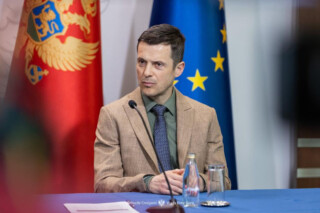By U.S. Ambassador Judy Rising Reinke and U.K. Ambassador Karen Maddocks

Members of the international community who care about Montenegro’s Euro-Atlantic path have been deeply shaken by recent events regarding the enthronement of Metropolitan Joanikije. There’s no doubt these events aroused strong feelings. In addition to foreign actors, they attracted extremists as well, who sought to use the enthronement for achieving their goals, including efforts to destabilize the state and fuel divisions in society.
As numerous surveys have shown, most Montenegrin citizens, regardless of political differences, want their country to join the EU. In order for Montenegro to take its rightful place along with free and democratic countries of Europe, those who believe in a multiethnic, inclusive and democratic Montenegro must raise their voices and resist those who want to divide society on ethnic or religious grounds. It’s up to the citizens of Montenegro to determine the future of their country and create their own destiny.
We call on the Montenegrin government to focus on making progress in areas that will accelerate the country’s accession to the EU and contribute to the stability and prosperity of every citizen. Areas that require attention and action are well known: strengthening the rule of law, tackling organized crime, and fighting deeply-rooted corruption.
We praise recent successful actions in the security sector, including arrests in major organized crime cases. We also praise the efforts of police to find a balance between civil liberties and public safety during the enthronement of Metropolitan Joanikije. At the same time, the recent event has made it clear that Montenegro urgently needs a strong, independent, impartial judiciary, which would ensure that those who break the law are held accountable, regardless of their connections.
Religious issues are being at the core of leaders’ attention on all sides of the Montenegrin political stage, while insufficient attention is being paid to much more urgent issues. The Government must direct its energy to improving the quality of life of ordinary Montenegro people. It means better education and better health care — including putting the pandemic under control. If this country wants to stop the ever-present brain drain, there must be more opportunities for hard-working, talented individuals to make progress. Infrastructure needs to be improved to help economic growth that will reach all parts of the country.
Institutions need to be strengthened to ensure full trust of all Montenegrin citizens and that they provide services efficiently, which is why they exist.
We wonder what’s the benefit of having a national census that will, at this moment, collect data relating to the ethnic identity. Certain political forces cynically advocate for it, hoping to further drive a wedge between those who identify as Montenegrins and those who identify as Serbs. How does this help the country’s progress?
The United States, the United Kingdom and other international partners who share our views stand ready to support a constructive dialogue that should involve both political actors and civil society representatives, surpassing political, religious and ethnic divisions and aiming to boost trust and help create a shared vision for Montenegro’s progress on its road to the West. The success of such a dialogue will require strong political will and ultimately depends on the citizens of Montenegro, not the international community.
We call on all the people living in this country, who are committed to building an inclusive, democratic Montenegro, to do their best to calm tensions and initiate dialogue, on both local community level and the very top of political leadership. Now is the right time.



